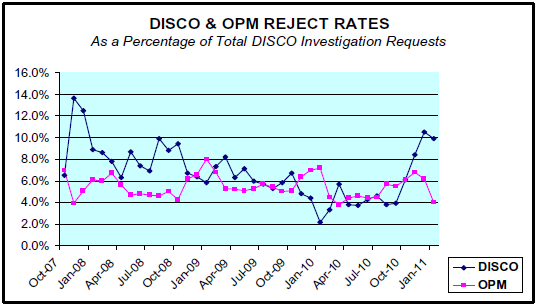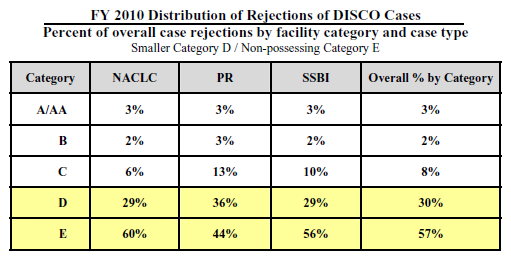- May 30, 2012
- Posted by: William Henderson
- Category: Special Issues
All security clearance requests sent from the Defense Industrial Security Clearance Office (DISCO) to the Office of Personnel Management (OPM) for investigation are submitted using the Electronic Questionnaires for Investigations Processing (e-QIP). OPM’s e-QIP has error catching and data validation features, but these features are unable to prevent many types of errors and omissions. DISCO and OPM only reject clearance requests with obvious and serious errors. From October 2007 to January 2011 the average combined rejection rate was 12.3%. Those requests that pass DISCO and OPM review are still often rife with other errors and omissions. Applicants and their Facility Security Officers (FSO) are primarily responsible for this problem.
When clearance requests are rejected by DISCO or OPM, it typically results in a delay of a couple of weeks to over a month before the applications are resubmitted. Supplemental instructions for completing the clearance application form, the Questionnaire for National Security Positions (Standard Form 86 – SF86), have been available to applicants from a number of federal agencies for a long time, but most merely restate the instructions contained in the form. Recently the Defense Security Service (DSS) posted instructions for completing the latest e-QIP version of the SF86. These new instructions are somewhat more comprehensive than other published instructions and should enable more applicants to complete an SF86 acceptable to DISCO and OPM.

Source: November 2010 and March 2011 National Industrial Security Program Policy Advisory Committee (NISPPAC) Reports
Note: Data for October 2010 were not reported; 6.1% has been used as data points for October 2010 for both DISCO and OPM to provide visual continuity.
Clearance application forms submitted by federal contractor personnel are initially reviewed by their company FSO or someone working under the supervision of the FSO. The only purpose for this review is to insure that the form has been completed properly. DISCO provides FSOs specific instructions for reviewing the SF86; however, the instructions have not yet been updated for the latest version of the form. The DSS instructions for applicants and FSOs fail to explain some of the more ambiguous questions on the SF86, for example the questions on foreign contacts and foreign activities (what is meant by close or continuous contact and what constitutes a bond of affection, influence, common interest, or obligation?). But even if these questions are answered inaccurately, the form probably will not be rejected by DISCO or OPM.
Once the FSO determines that the application form has been completed according to instructions, it is forwarded to DISCO where it is reviewed a second time. From October 2010 to January 2011 DISCO rejected 3,425 applications. Of the applications rejected by DISCO, 91% are rejected for the following reasons:1
- Not listing the requesting company as current employer
- Incomplete information concerning debts or bankruptcy
- Request ID number on e-QIP does not match the number on the Certification and/or Release(s)
- Missing Selective Service registration information
- Missing Certification or Release forms
- Missing information on relatives born abroad (U.S. citizens/nationals)
- Missing social security number of spouse
- Missing social security number for adult co-habitant
- Missing information for former spouse
- Missing references (character, residence, employment, or education)
Applications approved by DISCO are forwarded to OPM. From October 2010 to January 2011, OPM rejected 2,474 cases submitted by DISCO. Of those, over 1,500 were rejected due to problems related to fingerprints. This equates to over 6,000 cases a year rejected due to fingerprint issues. OPM rejects cases when the fingerprints cards are absent or illegible. The following 6 reasons account for 94% of cases rejected by OPM:2
- Missing or unclassifiable (illegible) fingerprint cards
- Missing or illegible information on release forms
- Erroneous place of birth information
- Erroneous date of birth information
- Missing references (character, residence, employment, or education)
- Erroneous social security number information

Source: November 2010 NISPPAC Report.
As shown in this chart, small and non-possessing contractor facilities experience rejection rates many times greater than medium to large facilities. Non-possessing facilities are those that do not possess/store classified information. Their personnel only have access to classified information at other contractor or government facilities. FSOs at these facilities often have other duties that occupy most of their time, and they generally have less experience and training than security personnel at larger facilities.
Consequently the quality of guidance they provide to applicants and the quality of their review of applicant SF86s result in significantly greater rejection rates. Since August 2009 DISCO has been accepting fingerprints submitted by federal contractors using the Department of Defense’s web-enabled biometric Secure Web Fingerprint Transmission (SWFT) system. The use of automated electronic fingerprinting devices will reduce or eliminate fingerprint rejection due to poor quality, as well as speed capture, submission, and processing time. Of the approximately 13,000 cleared contractor facilities under the National Industrial Security Program (NISP) about 11% are currently using SWFT. Participating federal contractors are responsible for procuring their own equipment, and all NISP contractor facilities will be required to submit fingerprints electronically by December 13, 2013.3
As previously stated many clearance applications reviewed and found acceptable by company FSOs, DISCO, and OPM contain undetected errors and omissions. Errors and omissions related to employment, residence, education, and foreign travel are usually only detected during the background investigation. Investigators frequently spend hours with applicants during their Subject Interviews going over and correcting errors on the SF86. These errors inevitably cause investigations to take longer. With the recent implementation of the March 2010 version of the SF86, which requires considerably more detailed information than previous versions, the problem with poorly completed application forms will only get worse and cause further delays.
by William Henderson
All Original Content Copyright © 2011 Last Post Publishing. All rights reserved.
